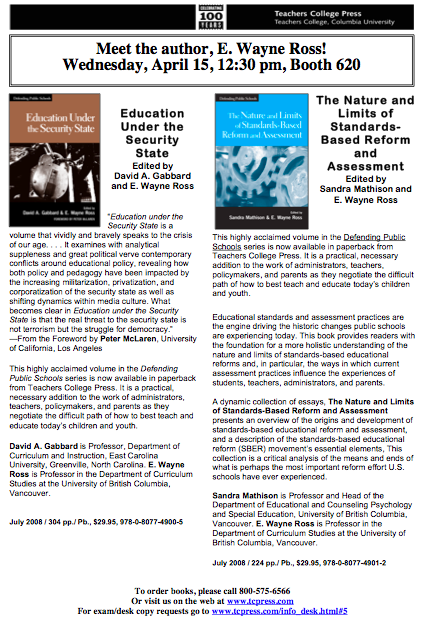I have to confess I was disappointed when Shepard Fairey developed the posters for Obama’s campaign. Shepard Fairey, before the Obama campaign, a skateboarder and graffiti artist stood for a challenge to authority, war and capitalism. Perhaps best known for the Obey campaign (Andre the Giant has Posse) but also his images directly challenging capitalism. Fairey is a contradictory character–using others copyrighted images but threatening to sue those who use his images. And so maybe creating the icon images for Obama, who is little distanced from the corporate, capitalist interests Fairey’s work critiques, are just part of that contradiction. Fairey himself says he is too corporate for the street artists and too street for the establishment.
But hope and change in education are not what the Obama posse is delivering. In fact, it is intensification of what came before–even higher (and probably national) standards, ‘better’ (and probably national) tests, support for charter schools, and now teacher pay for test results are what is being offered. The initial enthusiasm of new resources for education from the stimulus package is fading in the face of draconian demands from Education Secretary Arne Duncan and it becomes clearer with each speech that Obama is misinformed about the facts and this misinformation is critical to perpetuating the sense of crisis in education. Obama claimed that school drop out rates have increased three-fold when drop out rates have dropped by a third; he claimed that 8th grade achievement has dropped, when in fact it has risen; and set up fake goals–like having the highest proportion of college graduates in the world, when the US is almost there already.
It would have given me hope for change had Obama called for an evaluation of NCLB, even in small ways such as an analysis of NAEP scores pre NCLB and now. It would have given me hope for change if Obama demonstrated some understanding of the inevitable corruptability of high stakes assessment, whether in the form of mc tests or performance tasks. It would have given me hope for change had Obama focused on ways to cultivate options within public schools and promoted magnet schools rather than charter schools.
I don’t recall who said, authority has no wisdom, but methinks we are seeing this is action.

 Follow
Follow

 Michele Lamont in How Professors Think: Inside the Curious World of Academic Judgment opens the Pandora’s Box of peer review, the primary form of evaluation in higher education. Lamont’s curiosity, like Pandora’s, reveals secretive deliberations that all too often amount to judgments of quality based on the similarity of the work being judged to that of the judges. Lamont examines differences across disciplines, highlights the tension between the idea of having independently established criteria and standards and the inevitability of situational deliberation on what is good or bad, and ultimately calls for a more open, transparent approach to evaluation in higher education. In this later move, she searches for the hope that Pandora found at the bottom of the box.
Michele Lamont in How Professors Think: Inside the Curious World of Academic Judgment opens the Pandora’s Box of peer review, the primary form of evaluation in higher education. Lamont’s curiosity, like Pandora’s, reveals secretive deliberations that all too often amount to judgments of quality based on the similarity of the work being judged to that of the judges. Lamont examines differences across disciplines, highlights the tension between the idea of having independently established criteria and standards and the inevitability of situational deliberation on what is good or bad, and ultimately calls for a more open, transparent approach to evaluation in higher education. In this later move, she searches for the hope that Pandora found at the bottom of the box.
 For those who are doing or are interested in learning more about the MSC evaluation approach, think about signing up for the
For those who are doing or are interested in learning more about the MSC evaluation approach, think about signing up for the 